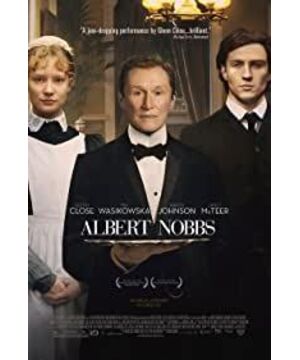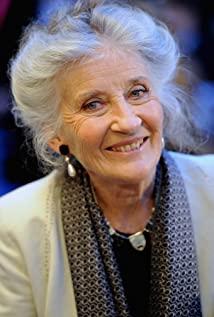It's a simple one-line story, like any tale told by the grandmother in the rocking chair by the fireplace, trembling with eye-catching memories. These stories neither glorify life like a fairy tale, nor show the grim side of life bloody throughout, but are told calmly, telling the story of 'there was a man and he died'. The story is over and the movie is over. Do you think it's worthwhile for Able to be sad? Just sigh to relieve your mood and go on with your life.
Look at Abe's life, get up and go to work, watch people count money after get off work, look at pictures of mother, turn off the lights and sleep. In order to hide his gender, he is usually cautious and reticent, and he is a transparent person with almost no sense of existence. Beginning from the decision to change gender to make a living after being raped at the age of 14, this repressed life has made Able less expression, less language, not even telling a joke, and a simple mind. The only thing that can light up his eyes in the boring daily life is the fantasy of the 'Knott's Tobacco Store' on the street corner, blue door, yellow walls, two closets, one for tobacco, and one for candy in the window. The second floor is enough for living, with a fireplace and warm sunshine. Nuo's longing for the store is interspersed several times in the film, and the details are also a little rich. It was a one-person shop at first, but after visiting Peggy's tailor shop, he fantasized about Catherine or Helen on the carriage to help take care of the business. Until he finally took Helen to describe it to her personally, the other side of the imaginary family was already convinced that it was undoubtedly Helen. Although it was exchanged for disdain and ridicule, Aber still felt happy. As soon as the film reaches the warm fantasy, the soundtrack is more clear and warm.
Let's say Abel is a woman, she has been suppressed by the distorted society to the point of being unable to become a normal woman. Under Peggy's guidance, she realizes her inner female role step by step. When she was happily running on the beach wearing a dress, it probably symbolized the psychology of trying to change her role as a woman, but unfortunately she quickly fell to the ground in reality. The expression on Nuo's face that had just gotten up in a state of embarrassment disappeared.
Say she is a man, but she has no desire for a man at all. They think that being together is simply being together, and they don't even touch Helen. Actually, I don't think movies have anything to do with homosexuality at all. She and she were just forced to hide their gender, trying to get married to get warm by being tied to a person. The difference is that Peggy finds the right person to have a happy life, while Nuo stubbornly does not analyze, and wishful thinking has compiled a dream to bring herself to sleep.
Able, who has 600 square meters, could have lived a good life as planned, and opened a small store with a market like his dream, which is his own. It's a pity that I envy Peggy's life blindly and unidirectionally looking for the so-called warmth and support, and finally caught up and made a wedding dress for the mean and despicable proprietress. Not realizing that someone else's life may not be right for you is the saddest thing.
The bad guy described in the film is the
boss lady. The stylish boilermaker is just a dream giant action dwarf and alcoholic and violent and a wretched creature who relies on a woman's infatuation for small favors. His girlfriend finally realized his essence and cut off the relationship, and he was destined to never get to the United States of his dreams. 'When I come to America, I can work hard, get rid of poverty and give you a good life balabala' don't be funny, the biggest difference between him and Able is that the latter has a dream of hard work, while the handsome man swears that the light in his deep eyes will extinguished easily.
There is actually a warm side to the solid color tone of the film.
Such as Peggy's astonishing side to appease the panic-stricken Able's...cough...cough. I admire her character very much. She dares to resist unreasonableness. With the same hidden identity, Mr. Pei is obviously more like a man. He is tall, humorous, intelligent and considerate. He dares to pursue what he likes and cares about his friends. Every time Able and Peggy are together I feel at ease, and now that Able's tragic ending has been met, it's a minute for a minute to make her happy.
For example, the photos that Able would look at before going to bed or when she was sick were the only memories she had about her mother, and the mother really protected the poor child, financially before death, and spiritually after death.
For example, Helen finally knocked on the door softly and called 'Mr. So even if she hated her previous use of Able, she couldn't help but feel warm at this moment. Able's efforts finally paid off, although it was too late.
Another example is that the doctor finally hated the life of living in secrets after learning that Able was a woman, and took the maid Mary away, and it was always a blessing to be married.
Another example is Helen's performance after she became a single mother, which made me feel that she has grown up, and the power of motherhood has made her strong outside of her beautiful appearance. And Peggy's 'Well now, we can't let that happen, can we?' as the closing remark can be regarded as the last warmth given.
The movie ends. All passers-by are just the real side of social existence, hating or loving is a waste of emotion. Let them pass by and become vague passersby again. And our lives are still unfolding.
View more about Albert Nobbs reviews











